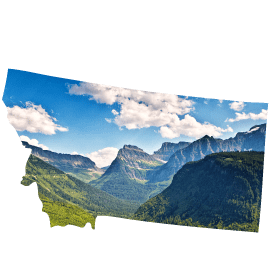Licensure Advancement : Montana
Identifying Effective Teachers Policy
Analysis of Montana's policies
Montana's requirements for licensure advancement and renewal are not based on evidence of teacher effectiveness.
The state offers two certifications that are valid for five years and renewable. The Class 2 Standard Teacher's license, which most closely resembles an initial certification, requires a bachelor's degree and completion of an educator preparation program. It is renewable with various combinations of semester credits and renewal units.
Teachers may advance to the Class 1 Professional Teacher's license if they have a master's degree and three years' teaching experience.
Montana does not include evidence of effectiveness as a factor in the renewal of a professional teaching license. Teachers must renew their licenses every five years through a combination of professional development and semester credits from accredited institutions of higher learning.
Recommendations for Montana
Require evidence of effectiveness as a part of teacher licensing policy.
Montana should require evidence of teacher effectiveness to be a factor in determining whether teachers can renew their licenses or advance to a higher-level license.
Discontinue license requirements with no direct connection to classroom effectiveness.
While targeted requirements may potentially expand teacher knowledge and improve teacher practice, Montana's general, nonspecific coursework requirements for license advancement and renewal merely call for teachers to complete a certain amount of seat time. These requirements do not correlate with teacher effectiveness.
End requirement tying teacher advancement to master's degrees.
Montana should remove its mandate that teachers obtain a master's degree for license advancement. Research is conclusive and emphatic that master's degrees do not have any significant correlation to classroom performance. Rather, advancement should be based on evidence of teacher effectiveness.
State response to our analysis
Montana declined to respond to NCTQ's analyses.
Select another topic
Delivering Well Prepared Teachers
- Admission into Preparation Programs
- Elementary Teacher Preparation
- Elementary Teacher Preparation in Reading Instruction
- Elementary Teacher Preparation in Mathematics
- Middle School Teacher Preparation
- Secondary Teacher Preparation
- Secondary Teacher Preparation in Science
- Secondary Teacher Preparation in Social Studies
- Special Education Teacher Preparation
- Assessing Professional Knowledge
- Student Teaching
- Teacher Preparation Program Accountability
Expanding the Pool of Teachers
Identifying Effective Teachers
- State Data Systems
- Evaluation of Effectiveness
- Frequency of Evaluations
- Tenure
- Licensure Advancement
- Equitable Distribution
Retaining Effective Teachers
Exiting Ineffective Teachers
Research rationale
Studies in the analysis include: Clotfelter, C. T., Ladd, H. F., & Vigdor, J. L. (2004) Teacher sorting, teacher shopping, and the assessment of teacher effectiveness. Clotfelter, C. T., Ladd, H. F., & Vigdor, J. L. (2006) Teacher-student matching and the assessment of teacher effectiveness. Retrieved May 20, 2009 from the National Bureau of Economic Research web site: http://www.nber.org/papers/w11936; Clotfelter, C. T. Ladd, H. F., & Vigdor, J. L. (2007) How and why do teacher credentials matter for student achievement? Ehrenberg, R. G., & Brewer, D. J. (1994) Do school and teacher characteristics matter? Evidence from high school and beyond. Economics of Education Review, 13, 1-17; Goldhaber, D., & Anthony, E. (2007) Can teacher quality be effectively assessed? National board certification as a signal of effective teaching. Review of Economics and Statistics, 89(1), 134-150; Goldhaber, D. D., & Brewer, D. J. (1997) Why don't schools and teachers seem to matter? Assessing the impact of unobservables on educational productivity. The Journal of Human Resources, 3, 505-523; Goldhaber, D. & Brewer, D. J. (2000) Does teacher certification matter? High school teacher certification status and student achievement. Educational and Evaluation and Policy Analysis, 22(2), 129-145; Hanushek, E. A., Kain, J. F., O'Brien, D. M., & Rivkin, S. G. (2005) The market for teacher quality. Retrieved May 20, 2009 from the National Bureau of Economic Research web site: http://www.nber.org/papers/w11154.pdf; Hanushek, E. A., Kain, J. F., & Rivkin, S. G. (1998) Teachers, schools, and academic achievement. Retrieved May 20, 2009 from the National Bureau of Economic Research web site:http://www.nber.org/papers/w6691.pdf; Harris, D. N., & Sass, T. R. (2006) Value-added models and the measurement of teacher quality. Harris, D. N., & Sass, T. R. (2007a) What makes for a good teacher and who can tell? Harris, D. N., & Sass, T. R. (2007b) Teacher training, teacher quality, and student achievement. Retrieved May 20, 2009 from the National Center for Analysis of Longitudinal Data in Education Research web site: http://www.caldercenter.org/PDF/1001059_Teacher_Training.pdf; Harris, D. N., & Sass, T. R. (2008) The effects of NBPTS-certified teachers on student achievement. National Center for Analysis of Longitudinal Data in Education Research; Jeptson, C. (2005) Teacher characteristics and student achievement: Evidence from teacher surveys. Journal of Urban Economics, 57,302-319; Monk, D. H. (1994) Subject area preparation of secondary mathematics and science teachers and student achievement. Economics of Educational Review, 13, 125-145; Riordan, J. (2006, April) Is there a relationship between No Child Left Behind indicators of teacher quality and the cognitive and social development of early elementary students? Paper presented at the annual meeting of the American Education Research Association, San Francisco, CA; Schneider, B. L. (1985) Further evidence of school effects. Journal of Educational Research, 78, 351-356.
For evidence on the lack of correlation between education coursework and teacher effectiveness, see M.B. Allen, "Eight Questions on Teacher Preparation: What Does the Research Say?" Education Commission of the States, (2003) at: http://www.ecs.org/html/educationIssues/teachingquality/tpreport/home/summary.pdf.

